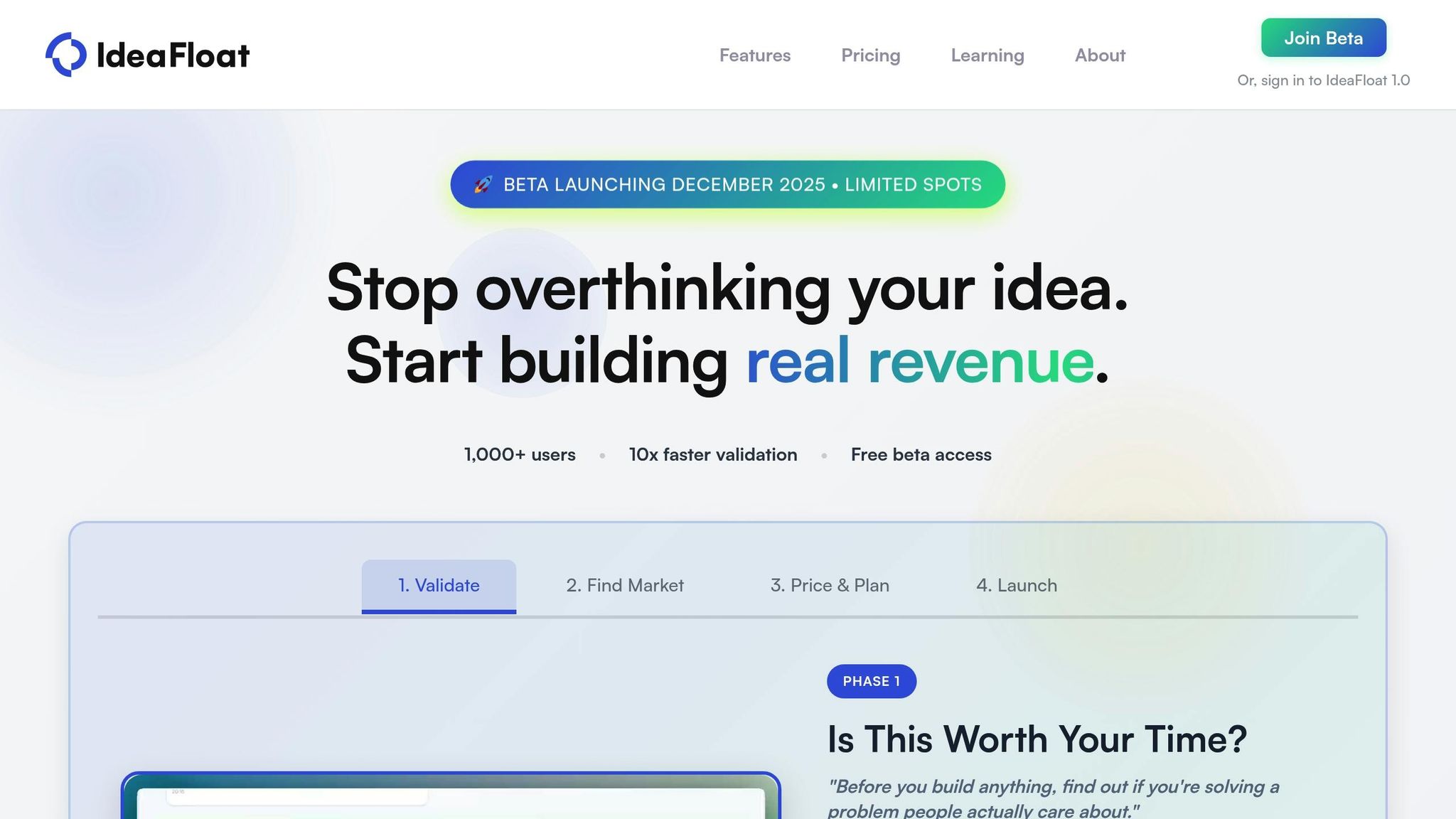
When starting a business, talking to the right people early on can save you time, money, and frustration. The article focuses on three key conversations every entrepreneur should prioritize for validating their ideas:
- Potential Customers: Learn their pain points, decision-making process, and what drives them to consider solutions.
- Industry Experts: Get insights into market trends, technical feasibility, and potential challenges.
- Mentors: Seek advice on strategy, execution, and avoiding common pitfalls.
These aren’t casual chats - they’re structured discussions with clear goals to turn assumptions into actionable insights. The article also provides scripts and tips for outreach, ensuring your conversations are productive and targeted.
Start Something Series - Customer Discovery: Validating Your Business Idea
The 3 Critical Conversations for Idea Validation
When you're working on validating an idea, having the right conversations can make all the difference. Each type of discussion brings unique insights that help shape your approach. Starting with early customer feedback, and then seeking guidance from experts and mentors, you can refine your strategy step by step.
Talking to Potential Customers
Engaging with potential customers is essential to determine if your idea truly addresses their needs. Instead of pitching your solution, focus on understanding their challenges, how they currently solve them, and what motivates their decisions. This approach uncovers market gaps and ensures your solution integrates seamlessly into their routines.
These conversations also shed light on purchasing habits - who influences their decisions, what prompts them to switch to a new solution, and which features they value most. This kind of insight is a goldmine for fine-tuning your marketing strategy and deciding where to focus your development efforts.
Once you’ve gathered this information, it’s time to broaden your perspective by consulting industry experts.
Consulting Industry Experts
Industry experts bring a high-level view that complements the granular feedback from customers. Their knowledge of trends, regulations, and competitors can help you evaluate whether your idea is feasible. They can confirm if the necessary technology exists, flag potential development hurdles, and even suggest realistic timelines based on similar projects they've seen.
Experts also provide valuable advice on strategic positioning. They can point out shifts in the market and potential risks that might affect your plan, giving you a clearer picture of how to navigate a competitive landscape. This guidance helps you refine your approach and prepare for challenges ahead.
Preparing for Effective Conversations
Getting ready for meaningful conversations is key to gathering useful insights. This means knowing who to approach, figuring out the best way to connect with them, and clearly understanding what you want to learn from each interaction.
Identifying the Right People to Talk To
Finding the right individuals to engage with requires more than just sticking to your existing network. Start by defining your ideal customer profile and identifying the spaces - both online and offline - where they spend their time.
For potential customers, focus on their behaviors rather than just demographics. For instance, if you're creating a project management tool for small agencies, avoid broad searches like "agency owners." Instead, join communities where they discuss their daily challenges, such as The Agency Collective on Facebook, local Chamber of Commerce meetups, or specialized Slack channels like Designer Hangout.
To connect with seasoned experts, LinkedIn is a powerful tool. Use advanced search filters to find individuals with over 10 years of experience in your target industry. Look for people who actively share insights, speak at conferences, or contribute to industry publications. Their public activity often signals whether they’re approachable and knowledgeable about the challenges you’re tackling.
Professional associations can also be a goldmine for expert connections. For example, the Project Management Institute has local chapters across major U.S. cities, where experienced professionals come together for monthly events. These gatherings offer an organic way to strike up conversations without the awkwardness of cold outreach.
When seeking mentors, prioritize relevance over name recognition. A mentor who has successfully built and sold a SaaS company in your field is far more helpful than a general business guru. SCORE mentors, available through the Small Business Administration, provide free advice and bring hands-on experience from various industries. Additionally, alumni networks from your college or past workplaces often include people who are genuinely interested in supporting your growth.
Once you’ve identified the right contacts, the next step is crafting outreach messages that make them want to engage.
Writing Clear Outreach Messages
Your outreach message is the first impression - it determines whether someone responds or ignores you. Craft a subject line that’s specific and benefit-driven. Avoid vague lines like "Quick question about your industry" and opt for something like "Looking for 15 minutes of insight on workflow automation challenges."
In the body of the message, establish your credibility quickly and show genuine interest in their expertise. Reference something specific about their work, like a recent article, project, or comment they made in a forum. This demonstrates that you’ve done your research and aren’t sending a generic message.
Keep your request small and precise. For example, ask for 15 minutes to learn how agencies manage client project timelines instead of asking for a broad chat about your business idea. This makes the request feel manageable and valuable to the recipient.
Include a brief introduction about yourself, focusing on why their input matters. For instance, "I’m working on a project timeline management tool based on challenges I’ve experienced firsthand" gives enough context without overwhelming them with details.
Offer flexibility in scheduling and format. Some people might prefer a phone call, others a video chat, and busy professionals might only have time for an email exchange. Let them know you’re willing to adapt to their schedule and communication preferences, which lowers the barrier to a response.
Once your outreach is ready, the next step is defining your goals for each conversation to ensure you get actionable insights.
Setting Goals for Each Conversation
Clear goals help turn conversations into meaningful takeaways that can guide your business decisions. Tailor your objectives to the type of person you’re speaking with.
For customer conversations, focus on understanding their current behaviors and challenges. Your aim should be to learn how they currently solve the problem you’re addressing, what triggers their need for a solution, and what factors influence their decision-making. Avoid leading questions like "Would you use a tool that automates project timelines?" Instead, ask open-ended questions such as "How do you manage project deadlines when multiple clients have overlapping needs?" This approach uncovers real pain points and workflow habits.
Expert conversations are about validating assumptions and identifying gaps. Your goals should include understanding industry trends that could impact your solution, uncovering any regulatory or technical hurdles, and gaining insight into competitive dynamics. Experts can also help you gauge realistic timelines for adoption and refine your market positioning strategy.
Mentor conversations should focus on business strategy and execution. Use these discussions to explore go-to-market strategies that have worked in similar situations, identify potential risks in your business model, and get advice on prioritizing resources. Mentors often provide valuable perspectives on pacing - whether you’re moving too quickly, too slowly, or just right.
Prepare specific questions for each interaction but stay open to unexpected insights. Often, the most valuable takeaways come from unplanned tangents that challenge your assumptions and reveal new opportunities.
sbb-itb-08dd11e
Scripts and Question Templates for Effective Conversations
The right words can turn casual chats into meaningful insights. Below are scripts designed to guide conversations toward useful feedback while keeping the interaction natural.
Scripts for Customer Conversations
When talking to customers, focus on their current challenges rather than pitching your future product. Start with questions that explore their workflows and pain points before suggesting solutions.
Opening script for reaching out to customers:
"Hi [Name], I saw your comment about [specific challenge they mentioned] in [forum/group name]. I’m researching how professionals like you manage [related issue], and I’d love to hear your thoughts. Could we set up a quick 15-minute call this week?"
This approach feels personal and shows genuine interest by referencing something specific they've shared.
During the conversation, ask questions like:
"What are your three biggest pain points right now? Thanks for sharing! I’m actually developing a tool that addresses your top issue by doing XYZ. Does that sound like something you’d use? Would you pay $X/month for it?"
It’s important to test demand early. For example, when validating Pilot's accounting service, Daher would ask potential customers:
"If we could handle your startup’s accounting for $100 a month, would you buy it? Yes? Great, we’re actually offering it now - can I send you an order form today?"
This method helped Pilot secure paying customers before writing any code, proving real interest in their service.
If someone hesitates or declines, follow up with:
"What would need to change for this to be valuable to you?" or "What’s the main reason this wouldn’t work for you right now?"
For interested customers, test their commitment:
"If this existed today, would you give me your credit card right now?"
This question distinguishes polite interest from serious intent. If they hesitate, their reasons can provide valuable insights.
These questions help uncover real customer needs and validate your ideas. Once you've gathered this feedback, consider seeking input from industry experts to further refine your approach.
Scripts for Expert Conversations
Experts are more likely to engage when you acknowledge their expertise and ask for strategic insights rather than basic information. Your questions should focus on trends, challenges, and market dynamics.
Outreach script for experts:
"Hi [Name], I’ve been following your work on [specific area], especially your recent [article/presentation/project]. I’m exploring opportunities in [market segment] and would really value 20 minutes of your perspective on some trends I’m noticing. Could we set up a brief call?"
During the conversation, focus on gaining deeper insights:
- "From your experience, what are the biggest challenges companies face when addressing [problem area]?" This helps you uncover potential hurdles you might not have considered.
- "Where do you see this industry heading in the next 2-3 years?" Understanding market timing can help you decide if it’s the right moment to act.
- "What conditions would need to exist for a solution like [brief description] to succeed with [target market]?" This helps validate your assumptions about market readiness.
For technical or regulatory insights, ask:
- "Are there any compliance or regulatory issues I should be aware of in this space?"
- "What technical standards or integrations are typically expected?"
These questions can save you from costly mistakes and clarify potential barriers to entry.
Once you've gathered insights from experts, turn to mentors for advice on execution and strategy.
Scripts for Mentor Conversations
When seeking advice from mentors, come prepared with specific challenges. Frame your questions around decisions you’re actively working through.
Outreach script for mentors:
"Hi [Name], I’m working on [brief description of your business] and facing some strategic decisions about [specific area, like pricing or go-to-market strategy]. Given your experience with [relevant background], I’d really appreciate 30 minutes of your guidance. Would you be open to a conversation?"
Structure your discussion around actionable advice:
- "I’m deciding between [Option A] and [Option B] for [specific situation]. What factors would you prioritize?" This gives mentors clear context to offer meaningful input.
- "What’s the most common mistake you see entrepreneurs make when [specific scenario, like launching or scaling]?" Learning from others’ missteps can help you avoid them.
- "If you were in my position with [current resources/constraints], what would you focus on first?" This helps you prioritize effectively.
For business model feedback, ask:
- "Does this pricing strategy make sense for [target market]?"
- "What potential red flags should I watch for as I test this with customers?"
When discussing go-to-market strategies:
- "What’s a realistic timeline for [specific milestone] in this type of business?"
- "Are there any key partnerships or relationships I should start building now?"
End mentor conversations with a clear plan:
"Based on our conversation, I’m planning to [specific actions]. Would it be okay if I updated you on how things progress?"
This follow-up shows you value their input and creates accountability for applying their advice. Mentors are invested in your success, so always come prepared, take notes, and share how their guidance has helped.
Using IdeaFloat to Improve Your Validation Process

IdeaFloat's AI-driven tools simplify the often time-consuming process of market research, turning what could take weeks into actionable insights you can use immediately. Instead of playing a guessing game to find your audience, these tools help you pinpoint the right people, understand market trends, and craft outreach messages that hit the mark - all before making first contact. This streamlined approach not only speeds up the validation process but also makes it far more accurate.
Using IdeaFloat for Customer Insights
Understanding your audience starts with knowing how they talk about their challenges. IdeaFloat's Consumer Insights tool dives into online communities to analyze real conversations, uncovering the exact language people use when describing their problems and potential solutions. This gives you a window into their world, helping you connect on their terms.
The Customer Profiler (ICP) takes it a step further by building detailed buyer personas. These include everything from demographics and psychographics to purchasing habits and common objections. This level of detail ensures your messaging feels personal and relevant from the very first interaction.
IdeaFloat's AI tools allow you to "meet" your customers before you even start building your product. You’ll gain insights into their pain points, where they spend time online, and what influences their buying decisions. For instance, Jennifer L., a founder using IdeaFloat, discovered 23 previously unknown communities through the platform. This discovery led to her first 50 sign-ups in just two weeks.
The language and insights gathered here are incredibly useful when developing conversation scripts, ensuring your communication resonates deeply with your audience.
Using Competitor Analysis and Market Sizing
Before diving into validation conversations, it’s essential to understand your market landscape. IdeaFloat's Competitor Analysis tool maps out your competition and highlights the alternative solutions your potential customers currently use. This helps you spot market gaps and refine your positioning, giving you a sharper edge in customer and expert discussions.
The Smart Market Sizing feature provides realistic projections based on trustworthy data. It calculates your market opportunity and gives you verifiable insights to present to mentors or investors. With these clear numbers, you’ll understand the scale of your opportunity and how far your reach can extend.
Armed with this market data, you can refine your outreach strategies to align with how your audience prefers to communicate.
Customizing Outreach with IdeaFloat Templates
Effective outreach starts with a deep understanding of your audience’s needs and communication style. IdeaFloat’s Go-to-Market Strategy tool delivers pre-made outreach scripts tailored to your market and customer segments.
The Community Launch Map pinpoints the online communities where your audience is most active. It even provides custom-written posts designed to spark conversations and drive engagement, giving you platform-specific strategies for maximum impact.
These templates go beyond simple email scripts. They provide frameworks for conversations with potential customers, industry experts, or mentors. By drawing on insights from the Consumer Insights tool, your outreach messages will feel natural and engaging, ensuring they resonate with the people you’re trying to reach.
Conclusion: Turning Conversations into Action
Engaging in three key conversations - with customers, experts, and mentors - lays the groundwork for validating your business idea. Customers help you understand if your solution truly addresses their pain points. Experts add valuable market context and technical know-how. Mentors, drawing from their own experiences, provide guidance to refine your strategy. Together, these conversations transform assumptions into actionable insights.
But here's the catch: without a well-thought-out approach, these discussions can fall flat. Consider this - 42% of startups fail because they offer something the market doesn’t need. This stark reality highlights the importance of making these validation conversations focused, strategic, and backed by thorough research.
This is where IdeaFloat's platform comes into play. It equips you with the data and tools necessary to approach these conversations with clarity and purpose. Instead of asking vague questions to potential customers, you can rely on targeted buyer insights to frame your queries effectively. For industry experts, competitor analysis helps you pinpoint knowledge gaps, ensuring your discussions are informed and productive.
IdeaFloat takes a broad yet precise approach, addressing both market and financial validations. This means your conversations aren’t just exploratory - they serve as deliberate steps toward building a business that’s grounded in reality.
By combining these insights with structured research tools, you’re no longer guessing - you’re acting with intention. Your customer conversations resonate because they reflect their actual needs and language. Your expert discussions are impactful because you’ve done your homework on the competitive landscape. And your mentor meetings become far more productive when backed by concrete data.
The ultimate goal isn’t just to validate your idea - it’s to gain confidence in your next steps. With the right conversations and the right tools, you can move forward with certainty, knowing you’ve engaged with the people who matter most and gathered the insights necessary to turn your vision into reality.
FAQs
How do I find the right people to talk to when validating my business idea?
To identify the right people to validate your business idea, start by defining your target audience. Ask yourself: who stands to gain the most from your product or service? Build detailed user personas that include specifics like age, profession, interests, and the challenges they face.
Begin with a small, well-defined group - maybe young professionals in a specific field or parents within a certain income range. This approach allows you to collect focused and practical feedback. You can also tap into the expertise of industry professionals or mentors who can share insights based on their experience. Prioritize having direct, meaningful conversations to better understand real needs and fine-tune your idea accordingly.
How can I make my outreach messages to industry experts more engaging and effective?
To make your outreach messages grab attention and spark meaningful conversations with industry experts, focus on these essential strategies:
- Make it personal: Take the time to reference the expert's work, accomplishments, or specific expertise. This shows you've done your research and genuinely value their insights.
- Keep it short and focused: Get straight to the point. Clearly state why you're reaching out and highlight how the conversation could benefit both parties.
- Pick the right platform: Platforms like LinkedIn work well for professional outreach. Interact with their posts or content first to establish a natural connection before sending a direct message.
A thoughtful and intentional approach can go a long way in opening up productive discussions with industry leaders.
What common mistakes do entrepreneurs make when getting advice from mentors, and how can they avoid them?
Entrepreneurs sometimes fall into the trap of leaning too heavily on their mentors, which can hinder their ability to make decisions independently. Another frequent challenge is having vague or conflicting expectations, often resulting in frustration or disappointment.
To steer clear of these issues, seek input from a range of advisors to gain different perspectives, but don’t hesitate to trust your gut when advice doesn’t quite fit your vision. Clearly communicate your goals and set boundaries with mentors upfront. While their guidance can be incredibly helpful, it’s essential to remember they’re not always right. Aim for a healthy balance between their advice and your own judgment.
Related Blog Posts
Get the newest tips and tricks of starting your business!


